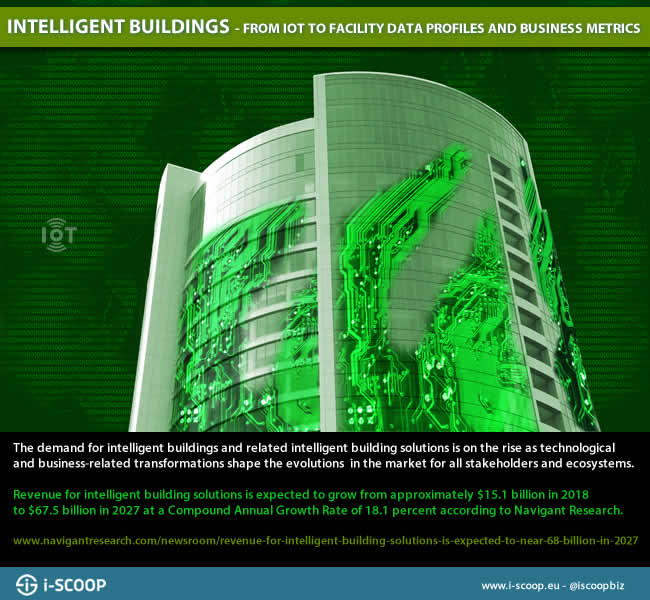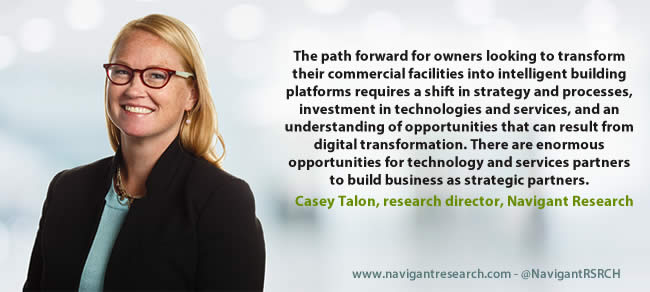The demand for intelligent buildings and related intelligent building solutions is on the rise as technological and business-related transformations shape the evolutions in the market with shifts for all stakeholders, including owners, facility managers, real estate developers, vendors, building system integrators and partner ecosystems.
With the Internet of Things and advanced analytics, changing customer expectations regarding the leverage of all building data, the need for a holistic approach, more focus on all stakeholders/enhancements and ongoing integration as some drivers, the digital transformation of intelligent buildings is taking center stage as silos continue to disappear.
Previously we mentioned facility optimization management as the philosophy in the converging real estate value chain where different factors on the level of energy, maintenance, building management and so forth shape the approaches of the market according to research firm Verdantix.
This convergence also has a consequence on building management systems (BMS), building energy management systems (BEMS) and other systems – and how they all connect and converge on multiple levels.

Intelligent buildings in convergence: from the asset and edge level to business outcomes and metrics
The convergence and integration, among others enabled by IoT platforms, goes all the way up from connected building assets and the related data and networks (where changes are coming, e.g. the new Power over Ethernet standard, artificial intelligence at the edge), to the different levels – with the field level being connected as intelligence and autonomous decisions shift to that edge and with fog computing and edge computing showing up in building and energy (cloud platform) architectures and Industrial IoT platforms for buildings – and, ultimately, the business platforms and goals realized by all this ubiquitous data, turned into actionable, analyzed and visualized data profiles of facilities.
Vendors of building energy management systems are changing the names of their offerings as are several BMS players with intelligent building management systems. On the level of the renaming of offerings, Verdantix for instance came up with facility optimization software/solutions as the new category of software having “grown from a core of energy management capabilities to encompass the enhancement of facility asset and maintenance management, as well as integrate portions of building automation for improved control and management of occupant comfort and wellbeing” as previously tackled.
In the end it’s all part of this intelligent buildings evolution which is de facto the digital transformation of the commercial building and real estate market with building automation systems, BEMS, overall facility management, the commercial real estate landscape as such and so forth.
The global intelligent buildings market in the era of digital transformation
According to May 2018 research from Navigant Research, revenue for intelligent buildings from a solution perspective is poised to increase at a compound annual growth rate (CAGR) of 18.1 percent throughout 20217.
With an estimated revenue for intelligent building technologies of roundabout $15.1 billion in 2018 Navigant expects the market to reach $67.5 billion in 2027.
Confirming findings from the market Navigant Research states that customers in the commercial intelligent buildings space are looking for solutions doing more than building energy management, leading to the mentioned rebranding. Building management systems, Navigant says, are being integrated with greater analytics capabilities and remote accessibility.
In other words: intelligent buildings move away from BEMS as the foundation of the market and BMSs as once delivering the technical details of automation and controls (alone) as Navigant Research puts it.
In the digital transformation of the intelligent buildings industry, “where IT infrastructure, data, and analytics can combine to translate a complete data profile of facilities, systems, and operations into business metrics” the face of facility management and smart buildings is evolving with fast evolutions of technologies under the big IoT umbrella whereby it’s not just about the many IoT technologies themselves but also mentioned technologies on the level of analytics and cognitive to name a few.

Towards a platform in the Energy Cloud?
At the same time IoT evolutions in the broadest sense also open the door for lower cost alternatives, Navigant states. These aim to help deepen the capabilities of existing intelligent building systems.
In other words: intelligent buildings constitute a market in full flux in an ongoing transformation that goes beyond fast evolving technologies as critical enablers and drivers.
The foundation of it all, where combinations, integration and disappearing silos add to the mentioned translation of a complete data profile of facilities, systems, and operations into business metrics, can become a platform in the Energy Cloud (the name for the dgital transformation of the electric grid as per Navigant Research) according to the research firm.
Such an Energy Cloud then becomes the transfer point for data, information, or energy that creates new value and revenue for owners and partners in the commercial intelligent buildings space.
Research director Casey Talon emphasizes that the movement to intelligent building platforms doesn’t come without the necessary changes on the level of strategy, investments and understanding of the opportunities in ecosystems of technology and partnerships.
The strategic partnership opportunities in intelligent buildings
The changes in the intelligent buildings market also clearly show on that ecosystem and alliances level whereby particularly IoT-enabled building platforms and full-fledged IoT platforms that come in various flavors for the evolving buildings and energy market, get a crucial place.
And how else could it be in an intelligent buildings market where in previous research Navigant found that the market for IoT for intelligent buildings is expected to exceed $22 Billion in 2026? That is a pretty large chunk of the revenue for intelligent building solutions.
As connected assets, IoT technologies and IoT platforms are essential in the data equation part leading to the new value and revenue in the intelligent buildings market, (again) in combination with other technologies, platforms, hardware, services and so forth, there are indeed enormous opportunities for technology and services partners to build business as strategic partner to quote Casey Talon.
All these intelligent buildings evolutions obviously don’t come without an impact on existing channel programs, ecosystems, partnerships and alliances in the market (and both vendors and their partners).
For system integrators and channel partners in the IoT-enabled intelligent buildings space (from those essential levels such as cabling up to the systems and business solutions) the consequences are clear: pick the right partners and partnerships and – at least as important – time to acquire new skills and deep understanding of the market evolutions within their specific niches/activities.
As said this is equally true for the customers, the owners of intelligent buildings. Quoting Casey Talon a last time: “The path forward for owners looking to transform their commercial facilities into intelligent building platforms requires a shift in strategy and processes, investment in technologies and services, and an understanding of opportunities that can result from digital transformation”.
More about the Intelligent Buildings Market Overview Q2, 2018
More in the Navigant Research report, Intelligent Buildings Market Overview (Q2, 2018), which “analyzes the global intelligent buildings market and explores the evolution of legacy solutions in the era of digital transformation”.
The study, among others, looks at forecasts regarding revenues for intelligent building solutions on the level of hardware, software and services for intelligent buildings.
The key intelligent buildings industry players in the report are segmented in four categories (automation and control, analytics, device manufacturers and service providers) and include Acuity Brands, Air Test Technologies, Automated Logic, Carma Industries, CommScope, Delta Controls, Demand Logic, ECS Global Solutions, EnergyAi, GE (Current), Honeywell, Johnson Controls, Legrand, Lynxspring, MACH Energy, Schneider Electric, Trane, Triacta Power Solutions and Urjanet.
More about the mentioned IoT for Intelligent Buldings research from Navigant Research in the 2017 report.
Top image: Shutterstock – Copyright: Khakimullin Aleksandr – All other images are the property of their respective mentioned owners.

